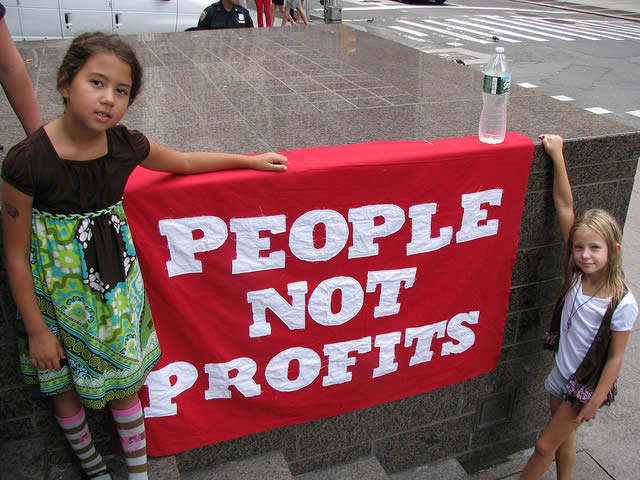
Over the last fifty years there was a great move to consolidation in the media industries – whether they be print, music, television, or film with the majority of content being produced and owned by a smaller and smaller number of corporations. The premise of each of these deals was that with each acquisition, the resultant larger company could keep production and distribution costs lower, and could have even bigger access to the public and so could generate bigger sales on higher margins than either company individually. This worked for decades and is the reason that we are left with only a handful of major music labels, film studio, and TV and film studios that dominate much of the media across the globe.
The problem they are all facing now, however, is that economies of scale just don’t matter in the digital realm. For digital newspapers there are no costs of printing and distribution, and as continually expanding influence of blogs shows, as long as you can produce the quality content, then a small and highly motivated team can wield as much power as a large media corporation. Technology blogs like The Verge and GigaOM have more sway in the field that the technology teams for major newspapers and tv news, and Pitchfork has more sway with music sales than NME or Q.But it is not just in news and text reporting where the power of scale is being eroded, even if that is the easiest example.
In publishing, some of the best-selling eBooks on Amazon are from independent authors that have deals directly with AMazon rather than a traditional publishing deal. And it will not be long before small independent digital publishers spring up, with the knowledge and taste that people trust in their specific niches – where they will act as the publisher and business managers for authors. Without the need to print on paper and get that book into shops, small independent publishers can compete on a level playing field – and without the monopolies and marketing budgets of scale, the larger publishers will start to see their profits dwindle. Quality and the agility to change to the evolving market is key, and larger corporations are simply worse at this as they are focused on profit maximisation – scale is beginning to have adverse effects.
In music, whilst remaining major labels fought over the parts of EMI maintaining their bigger is better motto of the last half-century – it is the smaller, leaner and more agile indies that are seeing sales growth and market-share increases. The costs of producing an album are coming down, and whilst studio time is still expensive as ever – home recording setups have got to the stage that the times of weeks spent in the studios to record an album are coming to an end. Larger indies like XL are having bumper years even with the decline of CD sales, with artists such as Adele outselling everything under the sun – and the extra clout of the majors are not needed to get people to buy her records. More and more people are exposed to new music via smaller often online radio stations, podcasts and blogs than ever before – and that whole huge marketing budget that used to generate sales for the majors is starting to mean less and less.
Television and film are slower industries to liberalise for the simple reason that whilst distribution costs may come down to near zero, and digital cameras and editing suites are bringing costs down – producing high quality video is still an expensive business. The change is coming, however, with Monsters, the surprise hit of last year, showing the way – with its equipment budget of just $15,000 (and total budget under $500,000). Digital is already making production cheaper, but the prices are still too high for true market liberalisation yet. But the change is coming.
The question is, nonetheless, how these consolidated media conglomerates are dealing with what is the greatest upheavel to not only sales competition with piracy, but content market-share with smaller independent labels, bloggers, and production teams? They are turning to the one place where that huge budget still means more than the quality of their output – and that is politics. The entertainment industry continue to lobby politicians for more aggressive copyright enforcement and longer copyright periods. With copyright extensions being granted at every turn, they have in reality created a system of eternal copyright where they can continue to cream off fees for works that not only owed a lot to others when being created (hello Mickey Mouse), but also should have passed out of copyright years ago if such extensions had not been granted.
What changes in the law such as those proposed in PIPA, SOPA, and ACTA is not only give entertainment companies a free ride over the freedoms and rights of individuals. But they give these companies the basis to crush legal competition, with little rights of recourse for those affected. There was recently a case where Universal fraudulently claimed copyright over a song by a band called After The Smoke. Universal had no rights to the song in question, One In A Million, but the song was taken down from Youtube on their complaint. Now, this was likely due to a miscalculation by an automated anti-piracy scan, but once the song was taken down at no point has Universal apologised, admitted their mistake and offered the band compensation. No, they eventually have permitted the band to broadcast their own song, and the band have no recourse in the courts.
With such power already devolved to these huge media conglomerates because technology companies are afraid of losing the very limited safe harbour provisions set out in the DMCA – things will only get worse with SOPA and ACTA. What recourse will a small independent publisher or label have if one of these companies fraudulently claims ownership of the work and has it removed from sale? None. These companies are too big and too slow to adapt to the digital revolution where their dominance through scale is being questioned by smaller outfits with a deeper focus on quality – but currently they have the law in their pocket to destroy the competition that way. If we want better quality journalism, better quality music, better quality TV – and everyone to get paid, then small independent firms are the future where competition is not decimated by economies of scale, and shareholders aren’t skimming off the top.
NB: TechFruit is part of The Descrier, a soon to be launched digital publication that is bootstrapped designed to compete with large-scale traditional media and give all contributors a fair deal. We believe in different, in people not profits.
[Image courtesy of Eden Pictures]


Pingback: Independence Is Key To Innovation | TechFruit